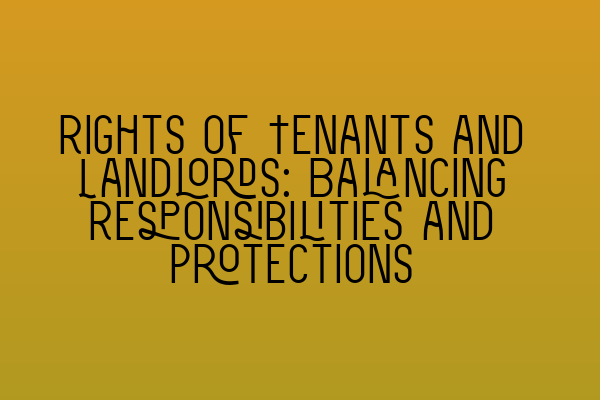Rights of Tenants and Landlords: Balancing Responsibilities and Protections
As a solicitor specializing in property law, I often encounter clients who are either tenants or landlords seeking clarity on their rights and responsibilities. The relationship between tenants and landlords is governed by various laws and regulations, which aim to strike a balance between the rights of tenants to affordable, safe, and habitable housing, and the rights of landlords to protect their investment and maintain their properties. In this blog post, we will explore the key rights and responsibilities of tenants and landlords, and how they can coexist harmoniously.
Rental Agreements and Security Deposits
The first point of reference for both tenants and landlords is the rental agreement. This legally binding contract outlines the terms and conditions of the tenancy, including the duration, rent amount, and the responsibilities of both parties. It is crucial for both tenants and landlords to understand the terms of the agreement and ensure they are compliant with relevant laws.
Security deposits are commonly required by landlords to cover any unpaid rent or damages to the property. As a tenant, ensure that you thoroughly inspect the property upon moving in and document any existing damages to avoid being wrongfully held responsible for them. Landlords, on the other hand, must adhere to strict regulations regarding the handling and return of security deposits, protecting the rights of tenants.
Repairs and Maintenance
Both tenants and landlords have specific responsibilities when it comes to repairs and maintenance. Landlords are obliged to provide safe and habitable premises, ensuring the property meets health and safety standards. This includes maintaining essential utilities such as water, heating, and electricity. However, tenants must also maintain the property and report any damages promptly to the landlord to avoid exacerbating the issue or being held responsible for excessive wear and tear.
Termination of Tenancy
The termination of a tenancy is another significant aspect that both tenants and landlords should understand. Typically, landlords cannot evict tenants without proper legal grounds or by following the correct legal procedures. Likewise, tenants must give appropriate notice before vacating the property. Understanding the specific notice periods required by law can prevent unnecessary disputes and protect both parties’ rights.
Dispute Resolution
Disputes between tenants and landlords can arise despite the best intentions and efforts. In such cases, it is essential to understand the available mechanisms for dispute resolution. Mediation and negotiation should be explored first, aiming to achieve an amicable resolution. However, if this is not possible, alternative methods such as arbitration or seeking legal advice may be necessary to protect the rights of both parties.
Protections for Vulnerable Tenants
Certain tenants, such as those who receive housing assistance or have disabilities, are entitled to additional protections under the law. Landlords must be aware of these protections and ensure they are not discriminating against any tenants based on their race, gender, religion, disability, or other protected characteristics. It is crucial for both tenants and landlords to exercise empathy, respect, and understanding when dealing with vulnerable individuals.
Conclusion
In summary, understanding the rights and responsibilities of tenants and landlords is crucial for maintaining a healthy and balanced rental relationship. By familiarizing themselves with the terms of the rental agreement, both parties can ensure compliance with relevant laws, protect their rights, and avoid unnecessary disputes. If conflicts arise, exploring methods of dispute resolution can help preserve the working relationship between tenants and landlords. At SQE Property Law & Land Law, we are committed to providing expert legal advice and guidance to all parties involved in property transactions. Contact us today to navigate your property journey with confidence.
Related Articles:
– Interactive SQE Mock Tests for Contract Law: Test Your Knowledge
– Contract Law Reforms: An Analysis of Recent Changes
– Parties in a Contract: Rights and Responsibilities
– The Importance of Ethics in Contract Law: A Comprehensive Guide
– Unveiling Duress and Undue Influence in Contracts
